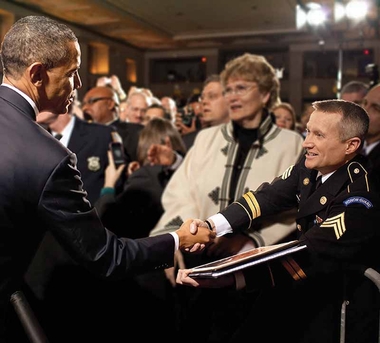What now for LGBT veterans?

by Rob Howard
Associate Editor
I am a gay veteran of the United States Air Force. I served for 12 years, and left with an honorable discharge. So did hundreds of thousands of other gay veterans. But as we approach Veterans Day on November 11, I think of the 100,000 or so who were not so lucky
From the end of World War II, to the repeal of the Don’t Ask, Don’t Tell (DADT) law in 2011, those military members suffered the humiliation of a less than honorable discharge. For many, it scarred their lives, hindered their careers and continues to affect them.
When I left the Air Force, it was to keep from joining that throng. I was then in the reserves, serving at the Pentagon. I had just completed a security clearance that was needed for my position. And shortly after that, recently promoted to Major, I came out. And I knew I was done with the military, because my next clearance review would have happened two years before I could retire. I would be found out, and thrown out. So I quit.
At the same time I was making this tough decision, there were other service members struggling with their careers. Colonel Margarethe Cammermeyer was one of those. In 1989, going through the same sort of security clearance review that I had been through, she revealed she was a lesbian.
She was serving in the Washington National Guard. The Guard immediately began discharge proceedings, and she was honorably discharged in 1992. But she wasn’t willing to have her military career end that way, and filed a lawsuit.
In 1994, a federal judge ruled that her discharge, and the ban on service by gay men and lesbians, was unconstitutional. Cammermeyer returned to the military and served as one of the very few openly LGBT service members, until she retired in 1997.
Sergeant Danny Ingram wasn’t so lucky. Following a 1992 statement he made in support of President Clinton’s pledge to lift the ban on lesbian and gay service members, Ingram became one of the first soldiers to be discharged under DADT.
He joined American Veterans for Equal Rights (AVER), and fought for the rights of LGBT service members. Sixteen years after his discharge, as president of AVER, he was invited to the White House to attend President Obama’s signing of the repeal of DADT.
Things have changed a lot since the repeal of DADT. Service members who are LGBT and married get the same benefits as their straight comrades in arms. LGBT veterans get the same veteran benefits.
But what about those hundred thousand veterans who can’t get benefits because of the less than honorable nature of their discharge?
A group that was active in getting DADT repealed can help. OutServe-SLDN has a whole section on their website dedicated to helping veterans get their discharges upgraded. Making this change is important. Federal veteran’s benefits range from help in paying for education, to low cost home loans, and – particularly important – access to the Veterans Administration healthcare services.
OutServe offers to help veterans get their discharge characterization changed, and get changes to other entries on their discharge paperwork that may affect their benefits, or their ability to get a job. Some people discharged have a notation on their discharge, even if it is honorable, that the separation was because they are homosexual, effectively outing them to potential employers.
OutServe notes that the standard for changes is high, and changes are not guaranteed. They outline the process on their website, www.outserve-sldn.org.
As we observe Veterans Day this year, take a moment to consider the sacrifices that Colonel Cammermeyer, Sergeant Ingram, and hundreds of other LGBT servicemember activists made to get Don’t Ask, Don’t Tell repealed, and who continued to work for the repeal of the ban on transgender service members, which happened this year.
Copyright 2016 The Gayly – November 11, 2016 @ 7:40 a.m.





